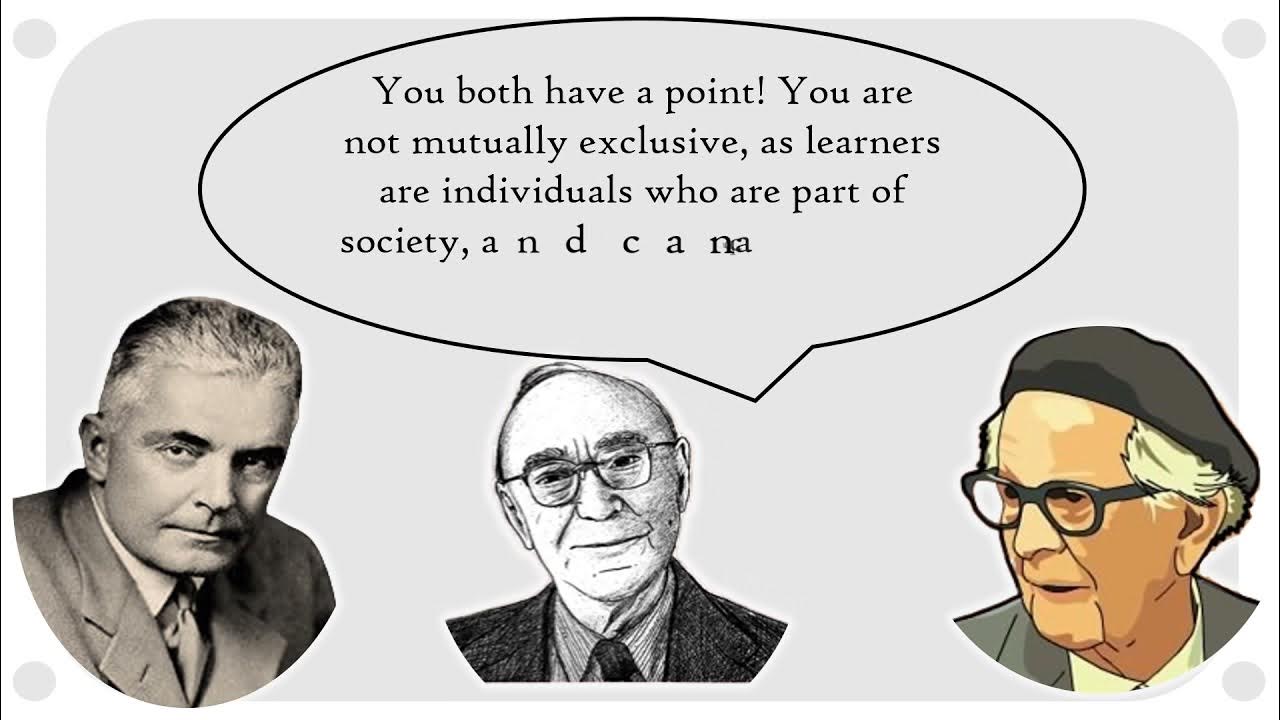Keywords to better understand the Philosophies of Education
Summary
TLDRThis video introduces viewers to key educational philosophies that shape teaching practices, including Essentialism, Perennialism, Progressivism, Existentialism, Behaviorism, Constructivism, and Reconstructionism. It explores the core ideas behind each philosophy, from Essentialism's focus on foundational skills to Reconstructionism's call for social change through education. Viewers are encouraged to reflect on how these philosophies influence teaching methods, student development, and the broader educational landscape. The video emphasizes the importance of understanding these philosophies to become a more effective and empathetic educator.
Takeaways
- 😀 The word 'philosophy' comes from Greek words 'philo' (love) and 'sophia' (wisdom), meaning 'love of wisdom'.
- 😀 Educational philosophy examines the goals, methods, and meaning of education, influencing how teaching and learning are approached.
- 😀 Essentialism emphasizes teaching fundamental academic knowledge and life skills, focusing on basic subjects like reading, writing, and arithmetic.
- 😀 Perennialism advocates for teaching timeless ideas through classic texts and Socratic dialogue, aiming to develop rational, critical thinkers.
- 😀 Progressivism centers on the experience of the child, promoting practical learning and preparing students for societal participation and personal growth.
- 😀 Existentialism stresses individual freedom and self-determination, encouraging students to choose their own purpose and take responsibility for their actions.
- 😀 Behaviorism focuses on shaping behavior through environmental stimuli, reinforcement, and punishment to encourage positive responses.
- 😀 Constructivism argues that knowledge is actively constructed by the learner through experiences and reflection, encouraging problem-solving and independent thinking.
- 😀 Reconstructionism seeks to address social issues through education, aiming for societal reform and encouraging students to engage in social action.
- 😀 Each educational philosophy emphasizes different aspects of teaching: essentialism on core content, perennialism on critical thinking, and progressivism on real-world application.
- 😀 The philosophical approach a teacher adopts influences classroom dynamics, teaching methods, and the curriculum, with the aim of fostering well-rounded, responsible individuals.
Q & A
What is the core idea behind Essentialism in education?
-Essentialism emphasizes teaching students the fundamental academic knowledge and skills, such as reading, writing, arithmetic, and moral conduct. It focuses on core subjects and aims to prepare students with the essential skills for life.
How does Perennialism approach education?
-Perennialism advocates for teaching timeless ideas that have universal value. It uses classical works and emphasizes critical thinking and rationality through Socratic dialogue, with a teacher-centered approach.
What is the main objective of Progressivism in education?
-Progressivism focuses on developing students into intelligent, enlightened citizens by adapting the curriculum to their personal experiences and needs. It promotes learning through practical, real-life experiences.
What does Existentialism in education emphasize?
-Existentialism centers on individual freedom, where students are given the opportunity to choose their own purpose in life. The curriculum is flexible, self-paced, and encourages personal responsibility and self-discovery.
How does Behaviorism impact the teaching process?
-Behaviorism focuses on shaping students' behavior through environmental conditions. Teachers modify behavior by providing reinforcement for positive responses and using punishment to discourage negative actions.
What is the main focus of Constructivism in education?
-Constructivism emphasizes that students actively construct their own understanding of the world through experiences and reflection. It encourages independent learning and provides opportunities for students to hypothesize, question, and investigate.
What are the goals of Reconstructionism in education?
-Reconstructionism aims to use education to address social issues and create a better society. It emphasizes social reform, democracy, and community-based learning, with students taking action on real-world problems.
How do Essentialist teachers view their role in the classroom?
-Essentialist teachers are expected to be intellectual and moral models for their students. They focus on academic rigor and emphasize mastery of core subjects, often adhering to a longer academic year and structured teaching.
What role do classic texts play in Perennialism?
-In Perennialism, classic texts and great books are central to the curriculum. Teachers guide students through these works to help them develop critical thinking skills and explore timeless philosophical and historical concepts.
How does a Constructivist classroom differ from traditional ones?
-In a Constructivist classroom, students are encouraged to engage in hands-on learning, pose questions, hypothesize, and reflect on experiences. Teachers facilitate this process, focusing on students' ability to learn how to learn rather than simply delivering content.
Outlines

Этот раздел доступен только подписчикам платных тарифов. Пожалуйста, перейдите на платный тариф для доступа.
Перейти на платный тарифMindmap

Этот раздел доступен только подписчикам платных тарифов. Пожалуйста, перейдите на платный тариф для доступа.
Перейти на платный тарифKeywords

Этот раздел доступен только подписчикам платных тарифов. Пожалуйста, перейдите на платный тариф для доступа.
Перейти на платный тарифHighlights

Этот раздел доступен только подписчикам платных тарифов. Пожалуйста, перейдите на платный тариф для доступа.
Перейти на платный тарифTranscripts

Этот раздел доступен только подписчикам платных тарифов. Пожалуйста, перейдите на платный тариф для доступа.
Перейти на платный тарифПосмотреть больше похожих видео

Kurikulum dan Pembelajaran | Landasan Kurikulum

THEORIES OF LEARNING: BEHAVIORISM, COGNITIVISM, & CONSTRUCTIVISM

S-1 PEND EKONOMI_PENGANTAR ILMU PENDIDIKAN Pertemuan ( Aliran aliran Pendidikan )

Foundations of Curriculum Development

Episódio 5 - Objetos de aprendizagem e aprendizagem ubíqua.

UTS Filsafat Pendidikan
5.0 / 5 (0 votes)
